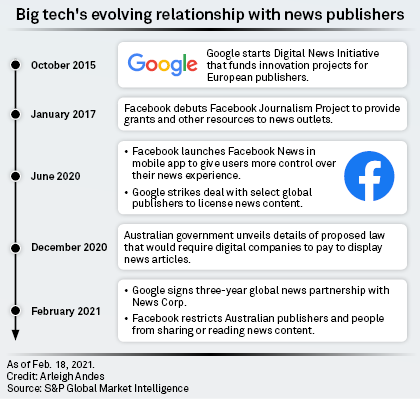Featured Topics
Featured Products
Events
S&P Global Offerings
Featured Topics
Featured Products
Events
S&P Global Offerings
Featured Topics
Featured Products
Events
S&P Global Offerings
Featured Topics
Featured Products
Events
Financial and Market intelligence
Fundamental & Alternative Datasets
Government & Defense
Professional Services
Banking & Capital Markets
Economy & Finance
Energy Transition & Sustainability
Technology & Innovation
Podcasts & Newsletters
Financial and Market intelligence
Fundamental & Alternative Datasets
Government & Defense
Professional Services
Banking & Capital Markets
Economy & Finance
Energy Transition & Sustainability
Technology & Innovation
Podcasts & Newsletters
22 Feb, 2021
By Anna Akins
Big tech's clash with the Australian government is far from over and could provide a foretaste of what is to come globally, analysts said.
Facebook Inc. and Alphabet Inc.-owned Google LLC are pushing back against a proposed law in Australia that would effectively require the platforms to pay publishers for the content distributed on their sites. Facebook has taken the hardest stance against the proposed ruling so far, restricting Australian publishers and people from sharing or reading news content. Google, meanwhile, has threatened to discontinue its search feature in Australia if the country proceeds with the law, though it recently took on a more conciliatory tone in announcing a three-year global news partnership with media conglomerate News Corp. that is owned by industry titan Rupert Murdoch.
These developments in Australia highlight the escalating power struggle between internet platforms and publishers. They for years have disagreed over how much news outlets should be paid for online content. The actions could serve as a test case for other countries looking to rein in big tech's market influence, analysts said.
"This is just the beginning," said Ahmed Banafa, a San Jose State University professor who has expertise in social media and cybersecurity, in an interview. "Australia is really the guinea pig [and] this could be an example for the rest of the Western world."
Pointing to Facebook's decision to block the spread of news content in Australia, Banafa warned such a move could spur a host of unintended consequences, including spreading misinformation and preventing public health agencies from relaying critical information to the public. He also noted Facebook's actions set a shaky precedent for how other tech players might choose to handle the flow of news content going forward.
"There's going to be danger for people to have somebody who's not elected to be at the top of making decisions [saying], 'I'm going to shut you down, I'm going to add this, I'm going to this and that.' That's not good," he said.

Facebook has received much scrutiny from lawmakers and consumers alike over its content moderation practices. Most recently, Facebook and peer Twitter Inc. came under fire for their actions taken to clamp down on harmful content following the Jan. 6 U.S. Capitol siege, particularly their steps to diminish former U.S. President Donald Trump's account access.
The social platform in a recent blog post noted Australia's new law "fundamentally misunderstands" the platform's relationship with news publishers that "willingly" use it to share their content. Posting on Facebook allows news publishers to sell more subscriptions, grow their audiences and boost advertising revenue, the company added, noting that news makes up less than 4% of content users see in their News Feed.
"Journalism is important to a democratic society, which is why we build dedicated, free tools to support news organizations around the world in innovating their content for online audiences," Facebook said.
Microsoft Corp., meanwhile, backed Australia's proposal, going so far as to encourage the U.S. to explore similar laws. "The United States should not object to a creative Australian proposal that strengthens democracy by requiring tech companies to support a free press," Microsoft President Brad Smith wrote in a recent blog post. "It should copy it instead."
Ray Wang, principal analyst and founder at technology research and advisory firm Constellation Research, noted big tech's latest battle in Australia calls into question how much freedom large tech companies should have in profiting off journalistic content and whether tighter regulations are needed in this arena.
"The question is, is it free content? Is it free data? And who gets to monetize this? That's really what's going on," Wang said.